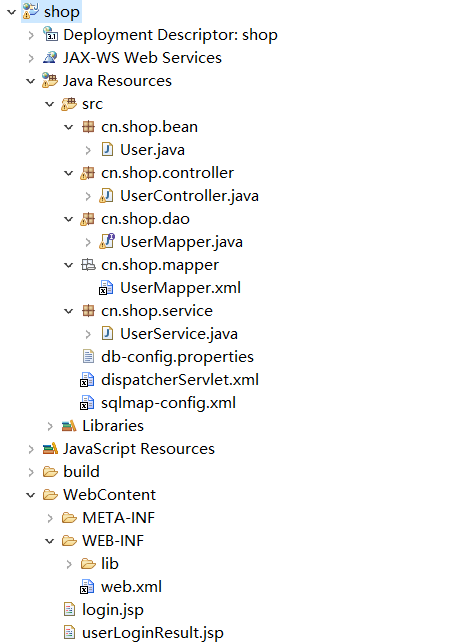1,SSM的简介
SSM(Spring+SpringMVC+MyBatis)框架集由Spring、SpringMVC、MyBatis三个开源框架整合而成,常作为数据源较简单的web项目的框架。
其中spring是一个轻量级的控制反转(IoC)和面向切面(AOP)的容器框架。
SpringMVC分离了控制器、模型对象、分派器以及处理程序对象的角色,这种分离让它们更容易进行定制。
MyBatis是一个支持普通SQL查询,存储过程和高级映射的优秀持久层框架。
2,SSM的搭建
笔者的数据库是Oracle,开发工具为Eclipse,项目的结构如下:

首先配置Spring+MyBatis部分,关于MyBatis的配置可以参见MyBatis之如何配置。
sqlmap-config.xml 文件

<?xml version="1.0" encoding="UTF-8" ?> <!DOCTYPE configuration PUBLIC "-//ibatis.apache.org//DTD Config 3.0//EN" "http://ibatis.apache.org/dtd/ibatis-3-config.dtd"> <configuration> <!-- 加载SQL定义文件 --> <mappers> <mapper resource="cn/shop/mapper/UserMapper.xml" /> </mappers> </configuration>
UserMapper.xml 文件

<?xml version="1.0" encoding="UTF-8" ?> <!DOCTYPE mapper PUBLIC "-//ibatis.apache.org//DTD Mapper 3.0//EN" "http://ibatis.apache.org/dtd/ibatis-3-mapper.dtd"> <mapper namespace="cn.shop.dao.UserMapper"> <!--用户登录--> <select id="login" parameterType="Map" resultType="cn.shop.bean.User"> <!--sq_s_user 是专门为user表创建的序列--> select * from s_user where name=#{name} and password=#{password} </select> </mapper>
UserMapper.java 文件

package cn.shop.dao; import java.util.Map; import org.springframework.stereotype.Component; import cn.shop.bean.User; public interface UserMapper { /** * 用户登录 * @param user 需要登录的用户信息,其中必须包含两个key,name和password。 * @return 用户登录成功后的信息 */ User login(Map map); }
User.java 文件

package cn.shop.bean; import java.util.Date; public class User { private Integer id; private String name; private String password; private Date register_time; public User() { super(); } public User(Integer id, String name, String password, Date register_time) { super(); this.id = id; this.name = name; this.password = password; this.register_time = register_time; } public Integer getId() { return id; } public void setId(Integer id) { this.id = id; } public String getName() { return name; } public void setName(String name) { this.name = name; } public String getPassword() { return password; } public void setPassword(String password) { this.password = password; } public Date getRegister_time() { return register_time; } public void setRegister_time(Date register_time) { this.register_time = register_time; } }
dispatcherServlet.xml 文件

<?xml version="1.0" encoding="UTF-8"?> <beans xmlns="http://www.springframework.org/schema/beans" xmlns:xsi="http://www.w3.org/2001/XMLSchema-instance" xmlns:context="http://www.springframework.org/schema/context" xmlns:jdbc="http://www.springframework.org/schema/jdbc" xmlns:jee="http://www.springframework.org/schema/jee" xmlns:tx="http://www.springframework.org/schema/tx" xmlns:aop="http://www.springframework.org/schema/aop" xmlns:mvc="http://www.springframework.org/schema/mvc" xmlns:util="http://www.springframework.org/schema/util" xmlns:jpa="http://www.springframework.org/schema/data/jpa" xsi:schemaLocation=" http://www.springframework.org/schema/beans http://www.springframework.org/schema/beans/spring-beans-4.1.xsd http://www.springframework.org/schema/context http://www.springframework.org/schema/context/spring-context-4.1.xsd http://www.springframework.org/schema/jdbc http://www.springframework.org/schema/jdbc/spring-jdbc-4.1.xsd http://www.springframework.org/schema/jee http://www.springframework.org/schema/jee/spring-jee-4.1.xsd http://www.springframework.org/schema/tx http://www.springframework.org/schema/tx/spring-tx-4.1.xsd http://www.springframework.org/schema/data/jpa http://www.springframework.org/schema/data/jpa/spring-jpa-1.3.xsd http://www.springframework.org/schema/aop http://www.springframework.org/schema/aop/spring-aop-4.1.xsd http://www.springframework.org/schema/mvc http://www.springframework.org/schema/mvc/spring-mvc-4.1.xsd http://www.springframework.org/schema/util http://www.springframework.org/schema/util/spring-util-4.1.xsd"> <!-- 开启注解扫描 --> <context:component-scan base-package="cn.shop"></context:component-scan> <!-- 开启mvc注解扫描 --> <mvc:annotation-driven/> <!--定义视图 通过internalResourceView来表示 使用的是Servlet/jsp技术--> <bean id="viewResolver" class="org.springframework.web.servlet.view.InternalResourceViewResolver"> <property name="viewClass"> <value>org.springframework.web.servlet.view.InternalResourceView</value> </property> <!--jsp存放的目录--> <property name="prefix"> <value>/</value> </property> <!--jsp文件的后缀--> <property name="suffix"> <value>.jsp</value> </property> </bean> <!-- 获取properties配置文件 --> <bean id="config" class="org.springframework.beans.factory.config.PropertyPlaceholderConfigurer"> <property name="locations"> <list> <value>classpath:db-config.properties</value> </list> </property> </bean> <!-- 获取数据源 --> <bean id="dataSource" class="org.apache.commons.dbcp.BasicDataSource"> <property name="url"> <value>${db.url}</value> </property> <property name="username"> <value>${db.username}</value> </property> <property name="password"> <value>${db.password}</value> </property> <property name="driverClassName"> <value>${db.dirverClass}</value> </property> </bean> <bean id="ssf" class="org.mybatis.spring.SqlSessionFactoryBean"> <property name="configLocation" value="classpath:sqlmap-config.xml"></property> <property name="dataSource" ref="dataSource"></property> </bean> <bean class="org.mybatis.spring.mapper.MapperScannerConfigurer"> <property name="sqlSessionFactoryBeanName" value="ssf"></property> <property name="basePackage" value="cn.shop.dao"></property> </bean> </beans>
db-config.properties 文件

db.url=jdbc:oracle:thin:@localhost:1521:xe
db.username=system
db.password=517839
db.dirverClass=oracle.jdbc.OracleDriver
配置到这里就完成了Spring和MyBatis的结合,接下来就是和SpringMVC的整合了。关于SpringMVC的配置可以参考基于注解实现SpringMVC+MySQL
web.xml 文件

<?xml version="1.0" encoding="UTF-8"?> <web-app xmlns:xsi="http://www.w3.org/2001/XMLSchema-instance" xmlns="http://xmlns.jcp.org/xml/ns/javaee" xsi:schemaLocation="http://xmlns.jcp.org/xml/ns/javaee http://xmlns.jcp.org/xml/ns/javaee/web-app_3_1.xsd" id="WebApp_ID" version="3.1"> <display-name>shop</display-name> <welcome-file-list> <welcome-file>index.html</welcome-file> </welcome-file-list> <!-- 这里是一个总控制器 --> <servlet> <servlet-name>spring</servlet-name> <servlet-class>org.springframework.web.servlet.DispatcherServlet</servlet-class> <init-param> <param-name>contextConfigLocation</param-name> <param-value>classpath:dispatcherServlet.xml</param-value> </init-param> </servlet> <servlet-mapping> <servlet-name>spring</servlet-name> <url-pattern>*.do</url-pattern> </servlet-mapping> <!-- 解决POST提交乱码问题 --> <filter> <filter-name>EncodingName</filter-name> <filter-class>org.springframework.web.filter.CharacterEncodingFilter</filter-class> <init-param> <param-name>encoding</param-name> <param-value>utf-8</param-value> </init-param> </filter> <filter-mapping> <filter-name>EncodingName</filter-name> <url-pattern>*.do</url-pattern> </filter-mapping> </web-app>
UserService.java 文件

package cn.shop.service; import java.util.Map; import javax.annotation.Resource; import org.springframework.stereotype.Service; import cn.shop.bean.User; import cn.shop.dao.UserMapper; @Service public class UserService { @Resource private UserMapper userMapper; public User userlogin(Map<String,String> map){ return userMapper.login(map); } }
编写完UserService.java文件后,我们可以进行一些测试,否则以后出错不便于调试:
新建一个cn.user.test.UserTest.java文件:
public class UserTest { @Test public void testName1() throws Exception { ApplicationContext ac=new ClassPathXmlApplicationContext("dispatcherServlet.xml"); Map<String,String> map=new HashMap<String,String>(); map.put("name","jame"); map.put("password","123456"); UserService userService= ac.getBean("userService",UserService.class); User user=userService.userlogin(map);//测试jame,123456 System.out.println(user); } }
UserController.java 文件

package cn.shop.controller; import java.util.HashMap; import java.util.Map; import javax.annotation.Resource; import org.springframework.beans.factory.annotation.Autowired; import org.springframework.stereotype.Controller; import org.springframework.web.bind.annotation.RequestMapping; import org.springframework.web.servlet.ModelAndView; import cn.shop.bean.User; import cn.shop.service.UserService; @Controller public class UserController { @Resource private UserService userService; @RequestMapping("/login.do") public ModelAndView userLogin(String uname,String upass){ Map<String,String> map=new HashMap<String,String>(); map.put("name", uname); map.put("password", upass); User user = userService.userlogin(map); ModelAndView mav=new ModelAndView(); if(user!=null){ mav.getModel().put("loginresult", "登录成功"); }else{ mav.getModel().put("loginresult", "登录失败"); } mav.setViewName("userLoginResult"); return mav; } }
@Resource注解和@Autowired注解都可以取出IOC中容器的对象,关于两者的区别可以查看Spring注解@Resource和@Autowired区别对比.
login.jsp 文件

<%@ page language="java" contentType="text/html; charset=utf-8" pageEncoding="utf-8"%> <!DOCTYPE html PUBLIC "-//W3C//DTD HTML 4.01 Transitional//EN" "http://www.w3.org/TR/html4/loose.dtd"> <html> <head> <meta http-equiv="Content-Type" content="text/html; charset=utf-8"> <title>用户登录</title> </head> <body> <h1>用户登录</h1> <form action="login.do" method="POST"> 用户名:<input type="text" name="uname"/><br/> 密码:<input type="password" name="upass"/><br/> <input type="submit" value="登录"/> </form> </body> </html>
userLoginResult.jsp文件

<%@ page language="java" contentType="text/html; charset=utf-8" pageEncoding="utf-8"%> <!DOCTYPE html PUBLIC "-//W3C//DTD HTML 4.01 Transitional//EN" "http://www.w3.org/TR/html4/loose.dtd"> <html> <head> <meta http-equiv="Content-Type" content="text/html; charset=utf-8"> <title>登录结果页面</title> </head> <body> ${loginresult} </body> </html>
到这里就完成了Spring+SpringMVC+MyBatis的配置了。
